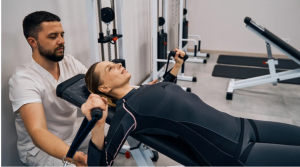Why Study Kinesiology?

The study of how the human body moves and how it affects health and general wellbeing is known as kinesiology. A broad range of jobs in sports, medicine, and other fields can be built on a foundation of study in the science of body mechanics.
Learning the fundamentals of how the body functions can benefit everyone’s physical well-being, even the most casual learners. Let’s examine in detail what kinesiology study is about and what kinesiologists do.
Kinesiology studies the mechanics of the human body in a manner similar to how auto mechanics studies the various components of cars. Things like limited joint mobility or low muscle endurance can have an impact on a person’s overall mental and physical health, much as a flat tire or blown fuse might damage a car’s complete functioning.
Kinesiology includes a variety of scientific disciplines and academic topics, such as:

Epidemiology: Epidemiology examines how and why behaviors including a healthy diet, exercise, and other physical activities might help prevent illness and contribute to a person’s overall physical well-being and fitness.
Motor Control and Learning: The study of motor manage and learning focuses on how the nervous system communicates with the body to control its functioning and movement. Additionally, it can look at ways to assist those who have lost their motor abilities due to trauma or sickness in recovering them.
Anatomy is the study of the various components that make up the human body, including the skeletal system, muscles, organs, and nervous system.
The Biomechanics of Human Movement: Human biomechanics is the study of how various components of the human skeleton, including the bones, joints, and tendons, interact to produce different types of movement.
Exercise psychology and exercise physiology both examine the potential psychological effects of exercise, while physiology focuses on the physical effects.
Kinesiology offers a “big picture” of how various bodily systems interact to produce a variety of movement by comprehending the complex ways in which the body functions. Kinesiology is a study area that focuses on the effects of movement science on humans on many sociological, psychological, and physical levels.
Why Become a Kinesiologist?

A kinesiologist is a medical specialist who uses their understanding of how the human body functions and moves to assist individuals in a variety of ways. Although improving a person’s quality of life is a kinesiologist’s primary objective, different kinesiologists take different approaches to this objective.
Here are just a few examples of the various vocations that kinesiologists could pursue, despite the fact that they can be found in a wide range of fields:
Kinesiologists are frequently employed as personal trainers or athletic instructors by gyms, institutions of higher learning, or even individual clients. They assist people in achieving their fitness objectives in the most effective way possible by utilizing their understanding of the human body. Many kinesiologists also serve as fitness advisors. Along with exercise, fitness advisors can recommend foods that will improve their clients’ health and performance.
Exercise Physiologist: Exercise physiologists guide their patients in using exercise as part of a holistic treatment plan for pain or illness. To enable their clients to lead more active lives, they create workout plans that can aid in muscle growth or improve flexibility and endurance.
Strength and Conditioning Coach: A profession in athletics as a strength and conditioning coach is pursued by certain kinesiologists. Their main objective is to assist athletes in reaching their physical potential, which is crucial for collegiate or professional sports teams.
How Drip Irrigation Installation Benefits the Environment
Kinesiologists can also be found in a variety of medical specialties, and some of them pursue careers as doctors, surgeons, medical officers, or EMTs. Others, such as physical therapists or doctors who specialize in sports medicine, assist patients in recovering from injuries. Another area of study for many kinesiologists is occupational therapy, which aims to aid patients in overcoming mobility challenges or regaining the fundamental motor abilities and skills required for daily life.
Kinesiologists can also use their understanding of how nutrition might affect the body to create dietary plans, just like a nutritionist or dietitian would. As nutritionists or dietitians, they can find employment in medical facilities, nursing homes, and educational institutions, or they can focus on creating meal programs for athletes that encourage muscle repair and endurance.
Where to Look for Kinesiology Courses

There are various paths you might take to fulfill your dream of becoming a kinesiologist. Which is best for you will mostly be determined by your long-term objectives and the kind of kinesiology job you want to follow.
Kinesiology is a popular topic of study thanks to its numerous applications, and many colleges and universities now offer it as a major. The University of Southern California, Rice University, and the University of Michigan Ann Arbor, among others, offer some of the best kinesiology degrees in the country, according to Niche. Kinesiology bachelor’s degree programs online are currently available from institutions including Eastern Oregon University, American Public University System, and Concordia University – Chicago.
Check out the online courses provided by the Kinesiology Institute if you’re more interested in a certification program. The institute provides a complete selection of kinesiology resources, including books, charts, and online courses, to support students of all skill levels.
There are also various online introductory courses that can be helpful if you’re not sure if you’re ready to dive into kinesiology fully or are more of a casual student. A fully recognized Foundational Level Kinesiology course is available on Udemy, and a variety of free courses are available on Coursera, including a Yale course on the Science of Well-Being and courses on exercise science. In order to assist you decide whether kinesiology is something you’d like to study further, Functional Kinesiology also provides a fantastic free course that can provide you a thorough introduction of the fundamentals.
Kinesiology provides some fascinating insights into the human body, from the value of mobility to maintaining an independent living to the advantages of exercise to our physical and mental health.





